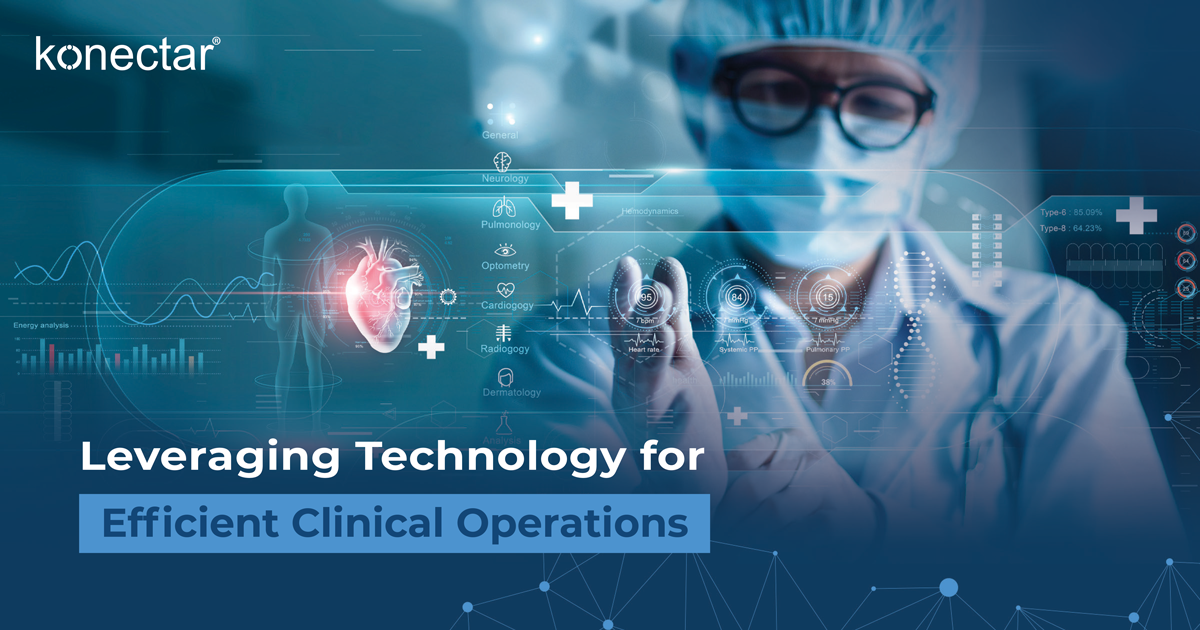Clinical operations, or ClinOps, include the management and coordination of various activities within the realm of clinical trials. The process involves creating protocols, enrolling patients, collecting and managing Data, and ensuring compliance and quality.
Technologies used to enhance ClinOps

To execute ClinOps processes efficiently, Life Science Companies are increasingly implementing diverse cutting-edge technologies. Some technologies that medical teams use to enhance ClinOps are as follows:
-
Electronic Data Capture (EDC)
Electronic Data Capture platforms allow patients to remotely input information, including their health data and responses to study-related questions. EDC platforms securely store all participant information and trial data in one centralized location. This not only streamlines data collection but also enhances data accuracy and accessibility.
-
Clinical Trial Management System (CTMS)
CTMS is a project management tool that centralizes various aspects of trial management. This includes contact information, document management, calendar scheduling, monitoring activities, site coordination, payment tracking, workflows, and more.
-
Electronic Trial Master File (eTMF)
The eTMF serves as the digital repository for all vital documentation related to clinical research operations. It not only houses essential documents but also provides a comprehensive regulatory overview. This electronic file management system enhances document organization, accessibility, and compliance, which are critical aspects of a trial’s success.
-
Electronic Clinical Outcome Assessment (eCOA and ePRO)
eCOA and ePRO solutions streamline the collection of data related to patient-reported outcomes. eCOAs enable clinicians, patients, KOLs and site staff to conveniently input outcomes into a digital system. An ePRO (electronic Patient-Reported Outcomes) specifically focuses on patient data entry, making it a valuable tool for patient data collection. These technologies enhance data accuracy and facilitate real-time data analysis.
-
eConsent
Electronic consent, or eConsent, solutions simplify and ensure compliance in the informed consent process. Electronic signature processes support different media formats like images, videos, and infographics for easy understanding and signature uploading.
-
Electronic Health Record Mining
These platforms extract valuable insights from electronic health records, aiding in patient selection, monitoring, and safety assessment. EHR mining assists in patient recruitment, data collection, and safety monitoring. It expedites the identification of eligible participants for trials and provides real-world healthcare data for research studies and Explore HCP reference.
-
Telemedicine Platforms
Telemedicine platforms allow patients to consult with healthcare providers remotely, reducing the need for in-person visits. These platforms use technology like video calls and messaging to make healthcare more accessible and convenient. By offering virtual appointments, telemedicine platforms improve healthcare delivery and adapt to patients' changing needs in the digital era.
-
Patient Engagement Software
Patient engagement software fosters better communication between patients and trial coordinators. It helps track patient progress, address concerns, and enhance overall participation
-
Supply Management Platforms
Supply management platforms ensure the efficient monitoring of supplies, including medication and equipment. These platforms help supervise inventory and automate reordering processes, reducing the risk of supply-related disruptions during trials
Challenges and Considerations
Given the sensitive nature of healthcare information, one primary concern is the paramount need for data security and privacy. However, such a situation is tackled with complex regulatory frameworks to ensure compliance and protect patient data.
Features such as encryption and access controls form the foundation of data and security in healthcare. Encryption ensures the protection of patient data during its storage and transmission. The access controls allow role-based access based on the user’s roles and responsibilities. Multi-factor authentication (MFA) adds extra security by asking users to provide many forms of identification to access technology platforms.
In clinical operations, professionals manage many aspects of clinical trials. They ensure trials follow rules, Recruit Patients, and oversee data. They also keep communication between sites and sponsors clear. Technology helps by streamlining processes, making data collection easier, and enabling remote monitoring. This makes trials more efficient and accessible, contributing to medical progress.
-
What are clinical operations in healthcare?
Clinical operations in healthcare encompass a broad range of activities aimed at facilitating the successful implementation of Clinical Trials and studies. This includes protocol development, site selection and management, patient recruitment and enrollment, as well as data management and monitoring. Clinical operations teams ensure compliance with regulatory requirements, oversee logistics and supply chain management, and play a pivotal role in ensuring trials are conducted efficiently and ethically.
-
What do clinical operations lead do?
Clinical operations lead to efficient clinical trials, development of new treatments, and improved healthcare.
-
How can technologies benefit clinical operations management?
Technologies such as data analytics platforms can benefit clinical operations management by providing insights into patient outcomes, staff productivity, resource utilization, and workflow processes. This data-driven approach enables healthcare facilities to identify areas for improvement, optimize operations, and make informed decisions to enhance overall performance.
-
How does technology contribute to clinical operations in clinical trials?
Technology plays a pivotal role in enhancing clinical operations within clinical trials. It helps to streamline processes and improve efficiency. Electronic data capture systems enable seamless data collection and management, while telemedicine platforms facilitate remote patient monitoring and consultations. Additionally, advanced analytics tools help optimize trial design and decision-making, leading to more informed and efficient clinical operations. Overall, technology enables greater accessibility, flexibility, and data accuracy in clinical trials, ultimately contributing to advancements in medical research and patient care.
-
What is the difference between clinical development and clinical operations?
Clinical development primarily involves the scientific and regulatory aspects of designing and conducting trials, while clinical operations focuses on the practical execution and management of these trials. While clinical development sets the groundwork for trials, clinical operations ensure their smooth implementation, adherence to timelines, and quality standards, ultimately contributing to the successful completion of clinical research endeavors.
-
What is the difference between clinical operations and clinical affairs?
Clinical operations involve the management and execution of clinical trials. Clinical affairs conducts various activities, such as clinical research strategy and interactions with regulatory agencies and stakeholders.
The convergence of technology and human expertise will continue to redefine the boundaries of what is achievable in healthcare. This will lead to more efficient medical trials and improved healthcare worldwide.
Explore konectar's Clinical Trial Analytics to gain a comprehensive understanding of patient enrollment distribution, participant demographics, and critical metrics for both major and preliminary trials related to products within your scope. For more details, Request a Free Demo today!



